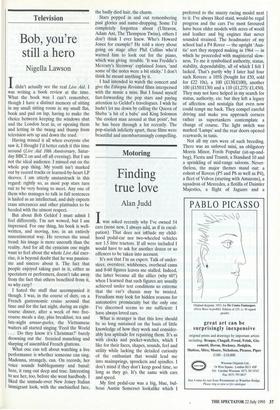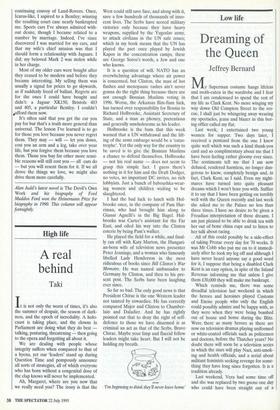Motoring
Finding true love
Alan Judd
Iwas asked recently why I've owned 54 cars (none new, I always add, as if in excul- pation). That does not intlude my child- hood pedal-car nor two-wheeled vehicles nor 1.5 litre tractors. If all were included I would have to ask for another dozen or so offences to be taken into account.
It's not that I'm an expert. Talk of under- steer, oversteer, wishbones, overhead cams and 0-60 figures leaves me stalled. Indeed, the latter became all the sillier (why 60?) when I learned that such figures are usually achieved under test conditions so extreme that the car's chassis may be twisted. Freudians may look for hidden reasons for automotive promiscuity but the only one I've discerned seems to me sufficient: I have always loved cars.
What is stranger is that this love should be so long sustained on the basis of little knowledge of how they work and consider- ably less aptitude for repairing them. It's as with clocks and pocket-watches, which I like for their faces, shapes, sounds, feel and utility while lacking the detailed curiosity of the enthusiast that would lead me into mainsprings, sprockets and spindles. I don't mind if they don't keep good time, so long as they go. It's the same with cars and speed.
My first pedal-car was a big, blue, bul- bous Austin Somerset lookalike which I preferred to the snazzy racing model next to it. I've always liked staid, would-be regal progress and the cars I've most favoured have been older models with acres of woad and leather and big engines that never sounded strained. The headmaster of my school had a P4 Rover — the upright 'Aun- tie' sort they stopped making in 1964 — in which he proceeded with magisterial slow- ness. To me it symbolised authority, status, stability, dependability, all of which I felt I lacked. That's partly why I later had four such Rovers: a 105S (bought for £50, sold for £22 10s), a 100 (£130/£100), another 100 (£150/£130) and a 110 (£1,275/ £1,450). They may not have helped in my search for status, authority, etc. but they left a legacy of affection and nostalgia that even now could tempt me back. They compel careful driving and make you approach corners rather as supertankers contemplate a change of course. The light switch was marked 'Lamps' and the rear doors opened rearwards, in taxis.
Not all my cars were of such breeding. There was an unloved mini, an obligatory Morris Minor, Fords Popular (sit-up-and- beg), Fiesta and Transit, a Standard 10 and a sprinkling of mid-range saloons. Never- theless, the major themes stand out: a cohort of Rovers (P5 and P6 as well as P4), a fleet of Volvos (starting with Amazons), a squadron of Mercedes, a flotilla of Daimler Majestics, a flight of Jaguars and a continuing convoy of Land-Rovers. Once, Icarus-like, I aspired to a Bentley; winning the resulting court case nearly bankrupted me. Sports cars I've always admired with- out desire, though I became related to a number by marriage. Indeed, I've since discovered I was married for my cars, and that my wife's chief mission was that I should form a relationship with Jaguars. I did; my beloved Mark 2 was stolen while in her charge.
Most of my older cars were bought after they ceased to be modern and before they became interesting. My selling them was usually a signal for prices to go skywards, as if suddenly freed of ballast. Regrets are for the ones I could have bought and didn't: a Jaguar XK150, Bristols 403 and 405, a particular Bentley. I couldn't afford them now.
It's often said that you get the car you pay for but that's a truth more general than universal The lesson I've learned is to go for those you love because you never regret them. They may — will — let you down, cost you an arm and a leg, take over your life, but you forgive them because you love them. Those you buy for other more sensi- ble reasons will still cost you — all cars do — but you will resent them for it. If we all drove the things we love, we might also drive them more carefully.
Alan Judd's latest novel is The Devil's Own Work and his biography of Ford Maddox Ford won the Heinemann Prize for biography in 1990. This column will appear fortnightly.



















































 Previous page
Previous page